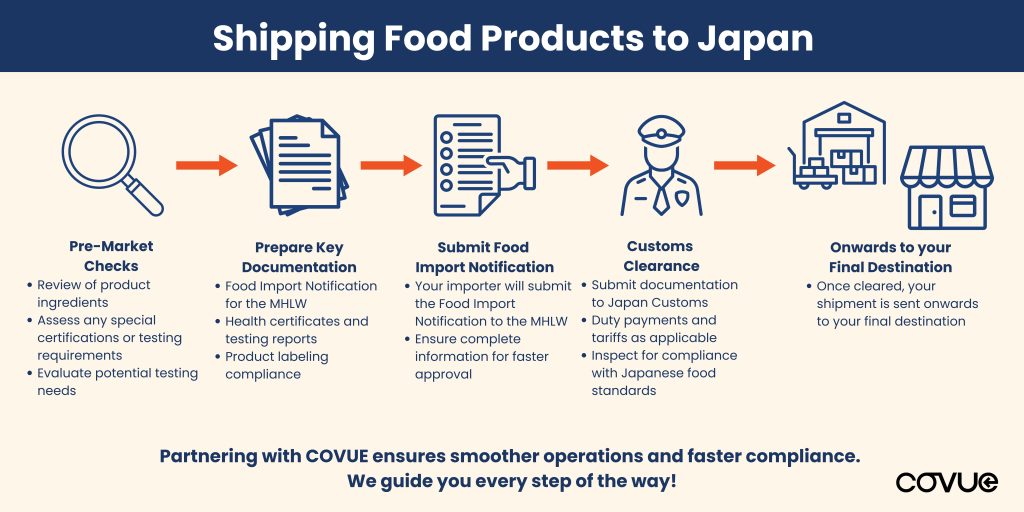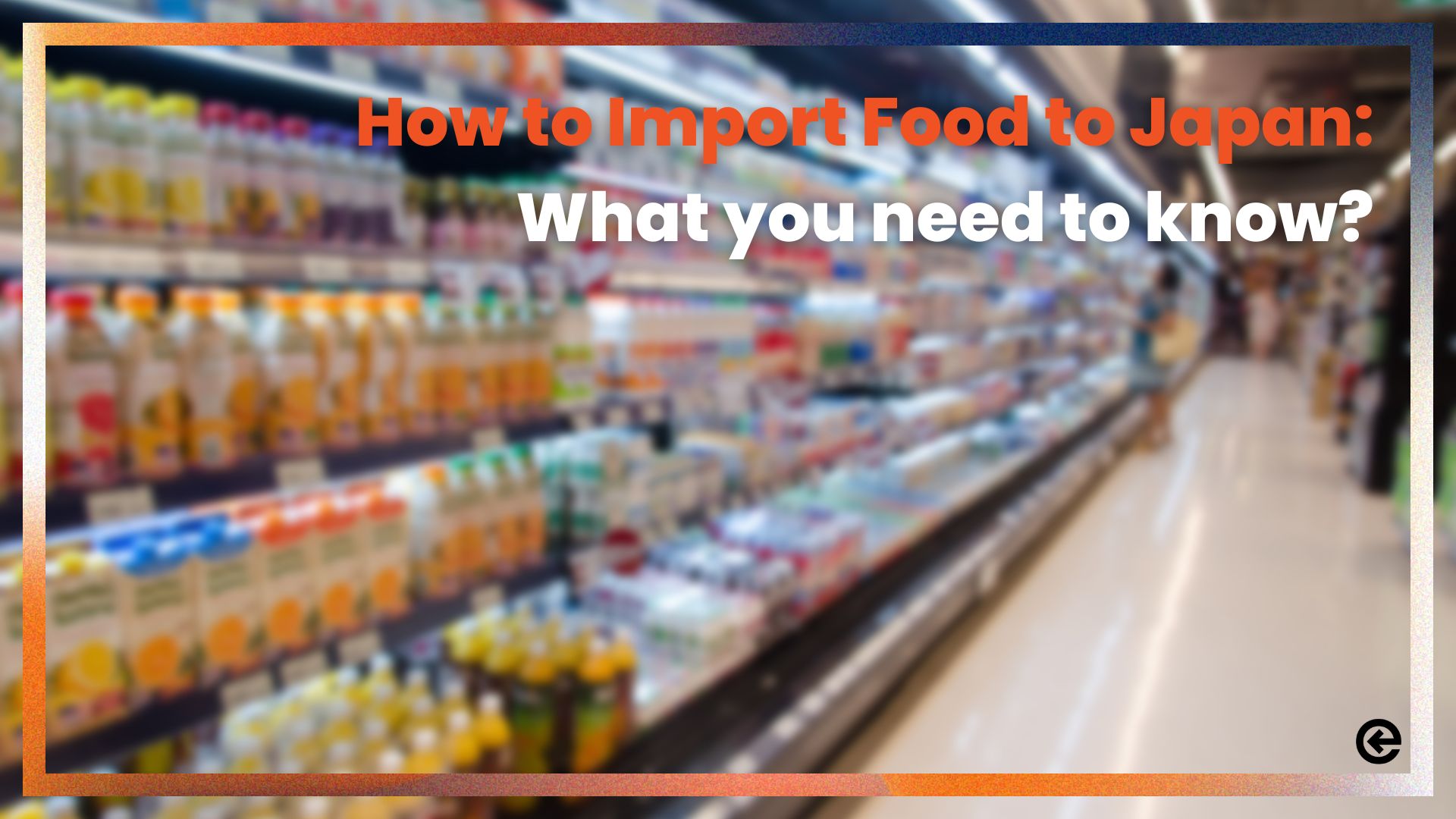How to Import Food to Japan: What you need to know?
Japan’s food import market is among the largest in the world, with a significant portion of food products being imported from international suppliers. However, navigating Japan’s complex food import regulations can be a challenge for global businesses seeking to introduce their products to the Japanese market. Whether it’s meeting stringent health and safety standards, acquiring the necessary permits, or ensuring compliance with local customs, the process requires a solid understanding of Japan’s import procedures.
In this guide, we’ll help you navigate the complexities of the food import process in Japan, highlighting what you need to know, what to watch out for, and how partnering with a trusted partner like COVUE can help smooth the path. From pre-market checks to navigating Japan’s customs requirements, we’ve got you covered.
Why Japan is a Strategic Food Market
Japan stands as a premier destination for food imports, offering a robust and discerning consumer base. Understanding the dynamics of this market is crucial for international brands aiming to establish a presence in Asia’s second-largest economy.
- Growing Demand for International and Health-Conscious Foods:
Japanese consumers are increasingly interested in international flavors and healthy, functional foods. The popularity of organic, non-GMO, and plant-based products is on the rise, especially among younger consumers seeking natural, diet-conscious options. - High Consumer Trust in Food Safety:
Japan’s stringent food safety regulations foster high levels of consumer trust. Imported foods that comply with these regulations are well-received, making Japan a stable market for global brands that meet safety standards. - Opportunities for Shelf-Stable and Specialty Foods:
The demand for shelf-stable foods, such as ready-to-eat meals and canned products, is growing due to busy lifestyles and urbanization. This presents a significant opportunity for international brands in these categories. - Supplements Classified as Food:
In Japan, dietary supplements fall under the food category and must comply with food regulations like the Food Sanitation Act and the Food Labeling Act. Brands must ensure their supplements meet these standards for market acceptance.
Overview of the Food Import Process
Regulatory Authorities Involved
In Japan, the importation of food products is governed by a range of regulatory authorities, each responsible for different aspects of the process:
- Ministry of Health, Labor and Welfare (MHLW):
The MHLW oversees food safety and public health standards, ensuring that all food imports comply with Japan’s Food Sanitation Law (食品衛生法). The ministry is primarily concerned with the safety of food products, including ingredients and additives. - Ministry of Agriculture, Forestry, and Fisheries (MAFF):
MAFF regulates the import of agricultural products and works to ensure that food imports meet Japan’s stringent safety and quality requirements. This includes managing quarantine inspections, animal and plant health regulations, and agricultural product standards. - Japan Customs:
Customs authorities ensure that all imported goods, including food, meet Japanese standards for import duties, taxes, and compliance with applicable laws.
Key Documentation Required
When importing food products into Japan, importers must submit the following key documentation:
- Food Import Notification (食品等輸入届出):
This is the core document for food imports and must be filed with the MHLW. It includes details such as product ingredients, manufacturing processes, and intended use. The notification must be submitted when your products arrive in Japan to ensure smooth customs clearance. However, we recommend having the documentation prepared before shipping to avoid unnecessary delays. - Health Certificates and Testing Reports:
Depending on the type of food, additional certifications may be required. For example, meat products need a certificate ensuring they are free from diseases such as BSE (bovine spongiform encephalopathy). Additionally, food additives or agricultural products may require pesticide residue testing or microbiological testing to verify compliance with Japan’s strict health standards. - Product Labels:
Food labels must comply with Japanese regulations, which include detailed information on ingredients, nutritional content, allergens, and country of origin.
What to Watch Out For When Importing Food
Common Pitfalls for Importers
- Incomplete or Incorrect Documentation
Japan’s customs and regulatory authorities are extremely strict about the accuracy of documentation. Even minor errors, such as incorrect ingredient lists or missing certifications, can cause significant delays. For example, failure to properly declare food additives or to provide the necessary safety testing documents could lead to inspections or even rejections of shipments. - Special Categories of Food
Certain food products, like meat, seafood, and dairy, are subject to more stringent regulations. For instance, beef imports require specific certifications to ensure the product complies with BSE-free requirements. As for seafood, sustainability certifications or pest-control certificates are necessary, especially for products sourced from countries with specific agricultural risks. Learn more about the restrictions and regulations surrounding these imports. - Misunderstanding Japan’s Labeling Requirements
Japan has very specific requirements regarding food labeling that are crucial for ensuring consumer safety and transparency. Food products imported into Japan must have clear and accurate labels detailing the Ingredients, Nutrition Information, Country of Origin, Expiration Date and Food Additives. Failure to meet these requirements—whether through incomplete or inaccurate translations, missing information, or improper formats—can result in customs delays, extra inspections, and fines.
Regulatory Oversight
Importers should also note that all products may be subject to inspection at the port of entry, including random checks for pesticide residues, microbial contamination, and other food safety hazards. These checks are particularly common for fresh produce and meat products. Products found non-compliant will be sent back or destroyed, incurring significant costs and potential damage to the importer’s reputation.
How to Prepare Your Food Products for Import

To ensure a smooth and efficient entry for your food products into Japan’s market, it’s essential to follow a step-by-step process that covers everything from pre-market checks to customs clearance.
Step 1: Pre-Market Checks
One of the key advantages of working with a local partner like COVUE is our pre-market checks. Before products are shipped to Japan, COVUE can help you conduct thorough checks on product ingredients, ensuring that everything aligns with Japan’s import and safety requirements.
Our pre-market checks cover the following:
- Ingredients Review: We will assess the ingredients of your product to determine if any require special certifications or testing (e.g., allergens, additives).
- Testing Requirements: We evaluate whether your products need to undergo specific testing (e.g., pesticide residue, microbiological testing, etc.) before they can enter Japan.
By partnering with COVUE, importers can avoid regulatory delays and reduce the risk of product rejections, ensuring that their products arrive in Japan ready for sale.
Step 2: Ensure All Documentation is in Order
Before you import, ensure that all the documentation required by the MHLW, Japan Customs, and other relevant authorities is complete and accurate. This includes the food import notification, health certificates, and testing reports. Work closely with your suppliers and your importer to ensure all documents are up-to-date and compliant with Japanese regulations.
Step 3: Compliance with Ingredient Regulations
Certain ingredients may require additional approval or testing. For example, if your product contains additives, you may need to file additional documentation. Additionally, if you’re importing meat, dairy, or seafood, specific testing (e.g., BSE, pesticide residues) may be required.
Step 4: File a Food Import Notification
Once all documentation is complete and verified, you will need to file a Food Import Notification with the MHLW and begin the process for importing. This notification should be filed when your products reach Japan, but we recommend preparing it before shipping to avoid any delays at customs. Learn more about the import process and working with an Attorney of Customs Procedure (ACP) here.
Step 5: Anticipate Potential Inspections
Even after the food import notification has been submitted, your products may be randomly inspected upon arrival in Japan. Ensure you have all necessary documentation and certification available to avoid delays or rejections.
Moving Forward: Ensure Your Food Imports are Ready
Japan’s food import regulations are stringent, but with the right preparation, it’s possible to navigate the complexities smoothly. By understanding the requirements, working with a local compliance partner like COVUE, and conducting pre-market checks, you can ensure that your food products enter the Japanese market quickly and efficiently.
To ensure a smooth and efficient entry for your food products into Japan’s market, it’s essential to follow a step-by-step process that covers everything from pre-market checks to customs clearance. Our comprehensive approach helps you streamline the process and avoid unnecessary delays.
At COVUE, we help brands like yours successfully navigate Japan’s food import process. From regulatory advice to documentation and testing support, we provide comprehensive services to ensure your products comply with Japan’s stringent food regulations.
With the right partner by your side, you can avoid delays, streamline your logistics, and open up a world of opportunities in Japan’s lucrative food market.
Contact us today to get started!
This article was originally posted on January 15, 2021, and updated with recent information on April 25, 2025.


